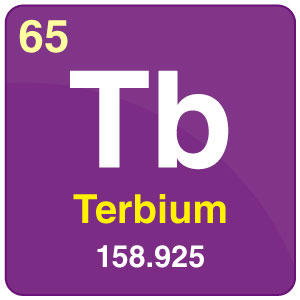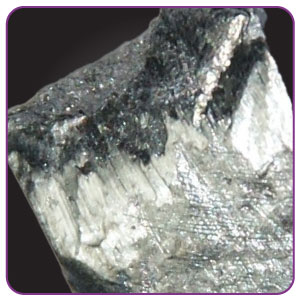Terbium

| Symbol | Tb |
| Atomic Number | 65 |
| Atomic Mass | 158.925 g.mol −3 |
| Discovered by | Carl Gustav Mosander |

Table of Contents
- Chemical Properties of Terbium
- What is Terbium?
- Uses or Applications of Terbium
- Environmental Effects of Terbium
Chemical Properties of Terbium
| Group | Lanthanides | Melting point | 1359°C |
| Period | 6 | Boiling point | 3230°C |
| Block | f | Density (g cm−3) | 8.23 |
| Atomic number | 65 | Relative atomic mass | 158.925 |
| State at 20°C | Solid | Key isotopes | 159Tb |
| Electron configuration | [Xe] 4f9 6s2 | CAS number | 7440-27-9 |
| ChemSpider ID | 22397 | ChemSpider is a free chemical database | |
What is Terbium?
- Terbium (Tb) is a chemical element with the atomic number 65 represented by the symbol Tb in the periodic table, which was discovered by Carl Mosander in the year 1843.
- It is named after the village of Ytterby in Sweden.
- Terbium is a soft, ductile, malleable and very rare element. It is so soft that it can be cut with a knife.
- Terbium is stable in the air to some extent and oxidises very slowly. It reacts with cold water
- It has simple ferromagnetic properties at temperatures below 219k. It changes into a helical antiferromagnetic state above 219 k, where all atomic moments in a particular basal plane layer are parallel.
- It is very rare to find this metal as a free element. Terbium is always available with other rare earth elements like monazite, xenotime, and euxenite. Some of the richest commercial terbium sources are ion adsorption clays of southern China.
Uses or Applications of Terbium
- It is used as a doping agent in calcium tungstate, calcium fluoride and strontium molybdate which are used in solid-state devices. Works as a crystal stabiliser of fuel cells.
- Alloys of terbium are used in the manufacturing of electronic devices like sensors, sound bug devices, and actuators.
- It is also used in the manufacture of colour tv tubes and fluorescent lights.
Environmental Effects of Terbium
- Terbium has no biological use and has low toxicity. When contacted, it may cause serious irritation to the skin and eyes.

Comments